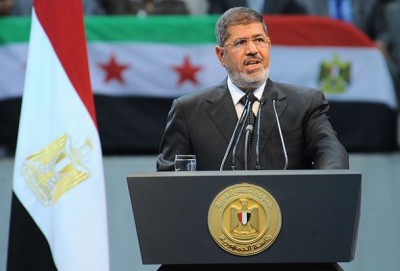The Return of History: The Morsi Death Sentence

“The crackdown against the opposition is only intensifying and the judiciary is very much at the forefront of this crackdown.” – Shadi Hamid, Brookings Centre for Middle East Policy, YNet, May 23, 2015
It stands not merely as a stark obituary but a broader death sentence of the Arab Spring. The message is fundamental: whoever is voted in the aftermath of enthusiastic protest against authoritarian regimes in the North African and Middle East will be dealt a terrible blow. They will be condemned as fundamentalist refuse and usurpers, or liberal lackeys, while the old guard will be favoured and lauded.
On May 16, Morsi and 105 other defendants were condemned to death for their role in a mass jailbreak in 2011 that took place under the regime of the ousted Hosni Mubarak. This was the surest sign that a vicious frost had issued forth to kill any buds from the spring.
Not content with that outcome, Morsi has again been placed on trial: for insulting the judiciary. As with so many things being done in Egypt by the revanchist authorities, he is not alone in being accused. There is Alaa Abdel Fattah, a person one would be reluctant to call a fundamentalist of any description or colour. There is the human rights lawyer Amir Salem. Then there is the political science academic Amr Hamzawy.
They all share one common thread, tenuous at points but otherwise clearly marked. They were all opponents of the Mubarak regime, and all that it entailed. But the issue goes deeper than that. All this constitutes an effort on the part of Abdel Fattah al-Sisi to reclaim, and submerge, history. No rival narrative will be countenanced.
A good deal of hypocrisy met the announcement of Morsi’s death sentence. The US position was stated as one of alarm, with a State Department spokesman noting that the decision was “not in line with Egypt’s obligations under international law”. “We are deeply concerned by yet another mass death sentence handed down by an Egyptian court to more than 100 defendants, including former president Morsi.”[1]
But Morsi’s continued existence was never deemed in the interest of Washington – at least when he was elected. On Morsi coming to power through elections in June 2012, the Obama administration expressed its disapproval with the freezing of its annual military aid portion of $1.3 billion. The Egyptian people may have expressed a view, but it wasn’t their view, ill-directed as it supposedly was. General Mubarak had been a monster of some weight, but he was one you could do business with. The fundamentalist genie had to be put back into the bottle, and the Muslim Brotherhood muzzled.
The grand mask of legal propriety is thereby being applied to the verdict. What the judiciary says, goes and by implication, what the state decides, goes. Human rights activists in Egypt are, in that sense, divided. The human element is ebbing out of the debate, and being replaced by tactical and strategic appraisals about how the law should be applied.
Some, among them the deputy head of the National Council for Human Rights Abdel Ghufar Shukr, fear that the sentence should only be carried out when matters have cooled – to kill Morsi now would be an open invitation to revolution, stoking the flames of the next overthrow (Middle East Eye, May 24).[2] You can’t subjugate history – it eventually comes back to drown you.
Others, such Mahmoud Kubbaysh, vehemently disagree. There was no room for “these kind of statements.” Accordingly, “We must work within the law – there is nothing that prevents the judgment being carried out.” Such totemic capitulation to the phantom credibility of the law has not been unusual.
The announcement of the death sentence has produced a round of protests in several countries. It prompted thousands of Arab Israeli followers of the northern branch of the Islamic Movement to protest on Saturday in the village of Kafr Sana. Egypt’s president was accused by Sheikh Raed Salah as “acting in the place of the Israeli and American occupation to strengthen the siege against the Gaza Strip” (Jerusalem Post, May 23).
There were protests in Turkey mounted by various NGOs and members of the Islamist Huda-Par, deemed an extension of Turkish Hezbollah, resulting in reported injuries to police and twenty arrests (AFP, May 23). Eleven are said to have been injured in the aftermath of clashes in the Kurdish-majority southeast in Diyarbakir province. Even the Turkish President Tayyip Erdogan had stated on record that, “Egypt is turning back into ancient Egypt.”
There were hundreds protesting in the French capital in the Place de la Republique, chanting such slogans as “We want justice” and “Silence kills.” Similar sentiments were expressed in Khartoum in Sudan.
All of these will not necessarily help Morsi, who still has to await the confirmation of his sentence at the hands of the Grand Mufti. There is also some room for appeal, however small it may be seem.
The death sentence is not so much a deterrent of anything as an expression of bloody sovereignty. Those receiving it will leave supporters who will remember to encourage its use when they, in turn, win power. At the end of every noose is the suggestion that the law of the vengeful jungle is the only one that counts.
Dr. Binoy Kampmark was as Commonwealth Scholar at Selwyn College, Cambridge. He lectures at RMIT University, Melbourne. Email: [email protected]
Notes
[1] http://www.ibtimes.com/morsi-
[2] http://www.middleeasteye.net/

